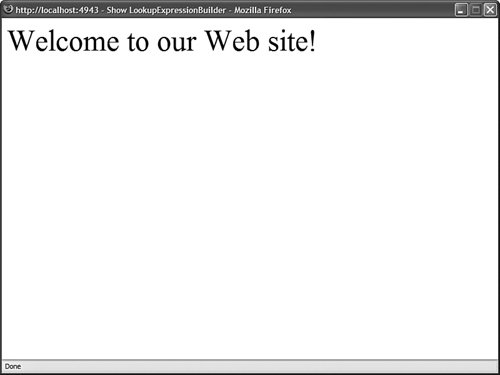Creating a Custom ExpressionBuilder
Creating a Custom ExpressionBuilderAn ExpressionBuilder class generates one expression from another expression. Typically, you use an ExpressionBuilder to look up a particular value given a particular key. The ASP.NET Framework includes the following ExpressionBuilder classes:
The ConnectionStringsExpressionBuilder has been used throughout this book whenever a connection string has needed to be retrieved. You use the following syntax when working with an ExpressionBuilder: <%$ ConnectionStrings:MyDatabase %> The <%$ and %> tags are used to mark an expression that should be parsed by an ExpressionBuilder. The prefix ConnectionStrings is mapped to the particular ExpressionBuilder class that is responsible for parsing the expression. ExpressionBuilders must always be used with control properties. For example, you cannot display a connection string in a page like this: <%$ ConnectionStrings:MyDatabase %> Instead, you must display the connection string like this: <asp:Literal Text='<%$ ConnectionStrings:MyDatabase %>' Runat="server" /> You can create a custom ExpressionBuilder when none of the existing ExpressionBuilder classes do what you need. For example, you might want to store your application settings in a custom section of the web configuration file. In that case, you might want to create a custom ExpressionBuilder that grabs values from the custom configuration section. Creating a Lookup ExpressionBuilderIn this section, you learn how to extend the ASP.NET Framework by building a custom ExpressionBuilder class. We'll create a Lookup ExpressionBuilder that looks up string values from an XML file. The LookupExpressionBuilder class is contained in Listing 25.10. Listing 25.10. App_Code\LookupExpressionBuilder.vb
Before you can use the LookupExpressionBuilder class, you need to register it in the web configuration file. The web configuration file in Listing 25.11 includes an <expressionBuilders> section that registers the LookupExpressionBuilder class for the prefix lookup. Listing 25.11. Web.Config
The LookupExpressionBuilder uses an XML file named Lookup.config to contain a database of lookup values. This file contains key and value pairs. A sample Lookup.config file is contained in Listing 25.12. Listing 25.12. Lookup.config
Finally, the page in Listing 25.13 uses the LookupExpressionBuilder. It contains a Literal control that displays the value of a lookup expression named WelcomeMessage (see Figure 25.3). Listing 25.13. ShowLookupExpressionBuilder.aspx
Figure 25.3. Displaying text generated by an ExpressionBuilder. You create a custom ExpressionBuilder by inheriting a new class from the base ExpressionBuilder class. The ExpressionBuilder class has the following methods:
The ExpressionBuilder class also supports the following property:
When you use an ExpressionBuilder in a normal ASP.NET page, the ExpressionBuilder returns code that is integrated into the compiled ASP.NET page. The GetCodeExpression() method returns a block of code that is injected into the compiled ASP.NET page class that gets created in the Temporary ASP.NET Files folder. Because an ExpressionBuilder might be used with either a Visual Basic .NET or C# ASP.NET page, the code returned by the GetCodeExpression() method must be language neutral. This means that you must represent the code that gets executed with the CodeDom. In Listing 25.11, the GetCodeExpression() method returns an instance of the CodeMethodInvokeExpression class. This class represents an expression that invokes a class method. In this case, the CodeMethodInvokeExpression class is used to represent the expression LookupExpressionBuilder.GetEvalData(). In other words, the ExpressionBuilder adds code to the compiled ASP.NET page class that invokes the GetEvalData() method contained in Listing 25.10. As an alternative to creating a normal ASP.NET page, you can create something called a no-compile ASP.NET page. A no-compile ASP.NET page is not compiled dynamically. You create a no-compile ASP.NET page by adding the following attribute to a <%@ Page %> directive: <%@ Page CompilationMode="Never" %> Note No-compile ASP.NET pages are discussed in Chapter 1, "Overview of the ASP.NET Framework." If you want an ExpressionBuilder to work with no-compile ASP.NET pages, then you must return the value true from the ExpressionBuilder.SupportsEvaluate property and implement the EvaluateExpression() method. The EvaluateExpression is executed at runtime when the no-compile ASP.NET page is requested. In Listing 25.11, the EvaluateExpression() method simply calls the GetEvalData() method. |